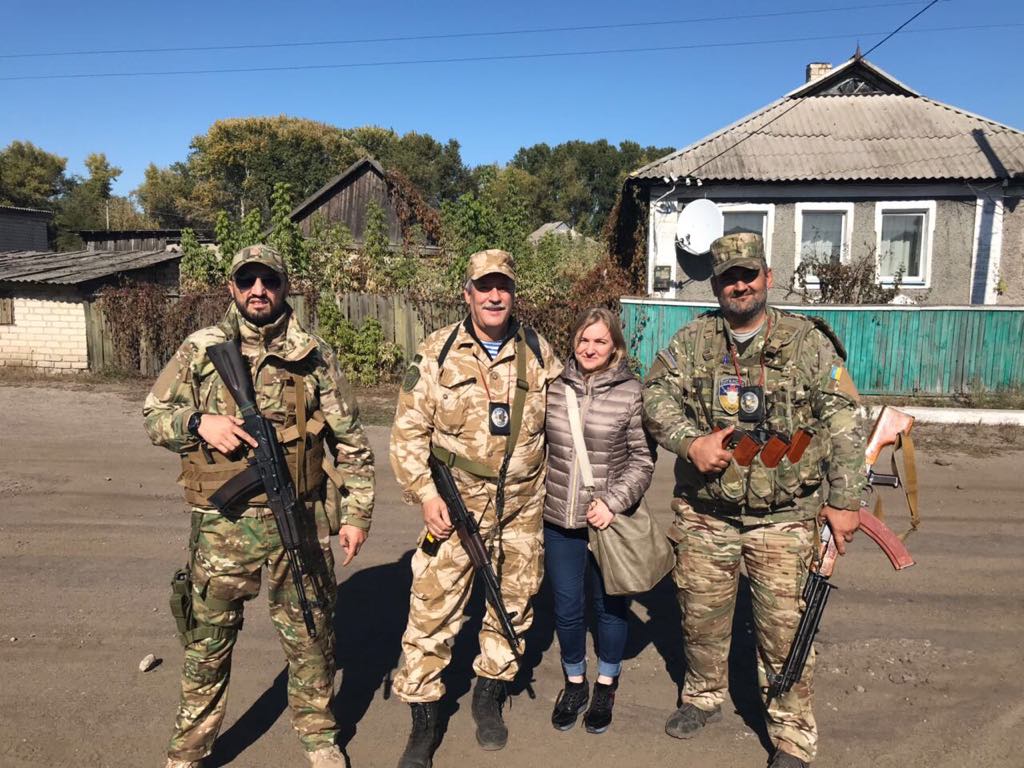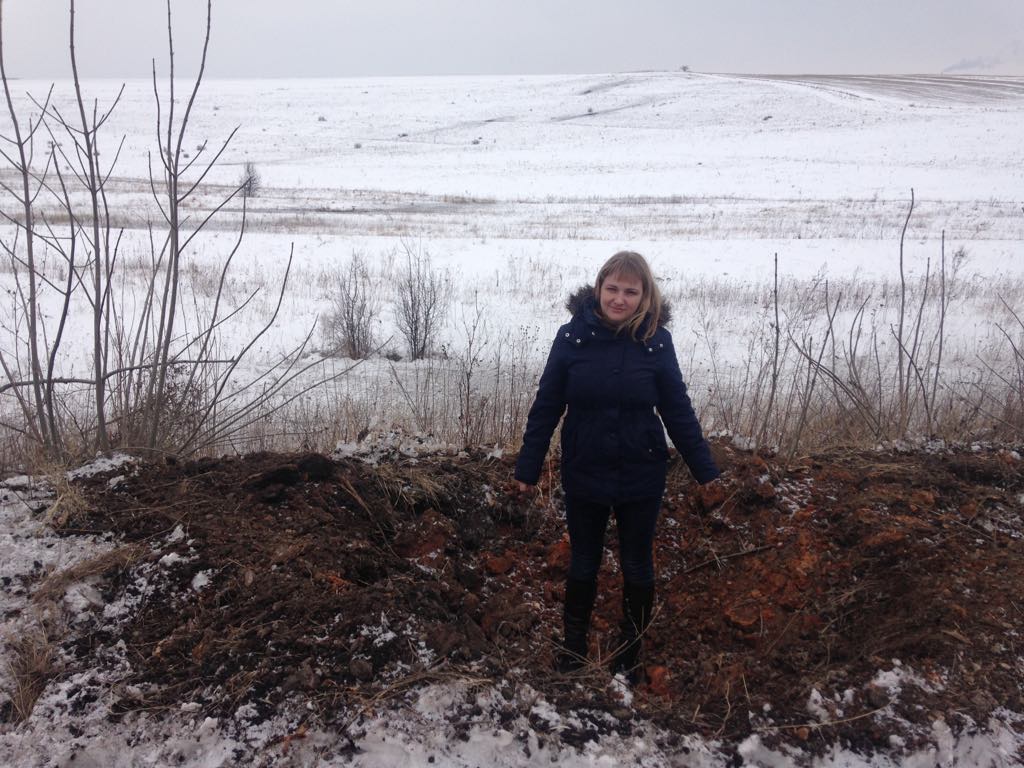
There is no particular motivation for volunteering. When war comes to your country, rational feelings fade into the background. You're rushing to do something, but you have no strategic plan, and don't know how and what to do. However, I remember my feelings at the start of the ATO [anti-terrorist operation in Donbas]: on May 13 [2014], the paratroopers of the 95th Brigade from my native Zhytomyr were ambushed. My school is located near the military unit where this brigade is based.
This was a shock for me so I began to raise money in a chaotic manner and noticed that someone else was already doing this, namely Vitaliy Deyneha [founder of the Come Back Alive charity organization], whom I did not know at the time. I wrote to him, saying let me help you, I have lots of contacts (as a journalist), and we will raise money together. I can remember even now how he replied: "you are the one whom I need".
And this is part of the motivation: at the beginning you do everything on emotion, because the country is at war. But you have a baby, and so you don't want a war in your house. I often visited Donetsk and Luhansk. I like it very much there, I also love Crimea a lot.
We did not have the name for our foundation at the time, but they always had the words "come back alive" on bulletproof vests back then, and that is how it came about. Then we had the hot summer of 2014 when we were volunteering 24 hours a day. How could I work at the same time back then? I am grateful to my colleagues who expressed their full understanding towards this.
At first people turned to us for items of personal hygiene, for such small but necessary things as socks, for example (they often lacked them). And then to get bulletproof vests, uniforms. It was only later that we focused on high-precision devices: thermal imaging cameras, night vision devices. Sometimes there were days when I received more than 500 calls to my phone with requests for assistance. Then the most horrifying calls began, when troops called when they were surrounded by the enemy, or when there was a call from this number yesterday with a request, and the next day you call that number and nobody takes the call, or someone replies that the person was dead.
But then we stopped a little and tried to organize everything, because we realized that we would not be able to cope. At the time, Vitaliy and I found a sponsor, who agreed to rent out an office and to pay wages, so that we could simply handle issues related to the army. We left our jobs and agreed to a lower salary, but I am grateful to Serhiy Savchenko, our sponsor, who helped us to take this step.
The Fund was launched in autumn 2014. There were all sorts of contributions, but mostly ranging from 100 to 500 hryvnyas. The Fund's main income came precisely from such contributions. The biggest contribution was from a man named Andriy. We still do not know who he is. Once he simply brought in half a million hryvnyas in a plastic bag.
Someone wanted to help the military, so we brought them together. It would happen in all sorts of ways, but in 2014 and 2015 all of society was fighting. There were indifferent people back then, and we still have them today. People who did not want to hear about the war. However, most citizens became volunteers: somebody gave money, someone donated things, someone helped displaced persons or let them stay at their homes, someone went abroad to bring vehicles to the frontline. The diaspora is very helpful. Although we sometimes say that the society is indifferent, at that time the Ukrainian society has shown its best side.
During the very active phase of fighting I did not go to Donbas. To be honest, I was afraid: my son was only 2 years old then. However, in the fall of 2014, I was obliged to help distribute aid, and I could not know where to distribute it without visiting the ATO zone.
There are various impressions one gets from visits, as there are different army units out there. The year 2014 saw an attempt to put the volunteer fighters movement, which is also very diverse, into a framework. There were ideological volunteer fighters who did not accept — and still do not accept — military discipline. There were also some people who went to the frontline to do business and looting, or who were hiding from criminal responsibility. People had different motivation for fighting
I saw the Aydar Battalion in its best and worst situations. I saw the arrival of representatives of the military service for law and order, who tried to clean their ranks. At the same time, we saw real personnel units that were disciplined but simply lacked the courage to go into battle when it was necessary. I saw how a rank and file serviceman became the head of a volunteer battalion and transformed this guerrilla detachment into a real combat-ready military unit.
In the spring-summer of 2015, it became clear that a new category of people was emerging for whom the frozen conflict had become lucrative. This was a big blow for me, and I realized that I could do more working as a journalist. When you volunteer and collect money, you cannot talk much about what you actually see. The trust in us would be lost, as would be the opportunity to help.

This is a very complicated group of people. I do not support the idea that, as is said, they themselves were to blame, and that they brought the war to their own land. They were simply unfortunate that the demarcation line is where it is. When you are a civilian you do not understand what is happening, except for the fact that there are armed forces on both sides.
Donbas is not the most patriotic region of Ukraine. The longer the war goes on, the more its inhabitants become resentful. Especially at Ukraine, because it, as the state, has an obligation to protect them. The longer the war lasts, the more often people are complaining. Obviously, it is clear that the war was a result of Russian aggression, but Ukraine cannot abandon its citizens.
When I was a volunteer, everything was great because everyone loved me and turned to me for help. Although when I worked at the Fund we drew up a blacklist of units where alcoholism flourished, where our help was lost (for example, where a thermal-imaging camera that cost $300,000 was smashed by drunk soldiers). We were indignant at those facts.
When we denied our help, the servicemen were offended. They attacked me when I published a refusal to finance the Aydar battalion. While you are helping you are good, but when you begin to point out the shortcomings the threats and negativity begin.
I do not like the Soviet system of caste, mystery and secrecy inside the armed forces. These people work for money provided by taxpayers and are kept at our expense. They are responsible for our integrity as a state and security and, therefore, they should answer to Ukrainian society, regardless of whatever you write to me in response to my viewpoint.
 Olha Reshetylova in Avdiivka, Donetsk region (February 2017)
Olha Reshetylova in Avdiivka, Donetsk region (February 2017)
There is a strategy for army's development until 2020 which clearly stipulates the strengthening of public control over the country's armed forces. A concept is now being developed to step up this control. These are our commitments, made by Ukraine, to its Western partners and what Ukraine is obliged to do if it wants to join NATO.
But no explanatory work is being carried out within society and the armed forces, and misunderstanding of these processes exists. When I say that the appointment of battalion commanders will take place on a competitive basis, everyone believes that we will have SMS voting for commanders. What does competitive basis mean? Let's say, there is a vacant position, and all units are being informed about this. A person sees the requirements, knows his or her experience and can submit his or her application. All candidates pass through selection, testing, interviewing, and then the command decides who will be appointed. This takes place under the close attention of the general public.
I would see this as the creation of a public council with powers prescribed at legislative level. A genuine public council should include veterans and reservists, military experts, lawyers in military law and international humanitarian law. That is, these should be people who understand how the armed forces should function.
The army is in better shape now, and it is better provided for in terms of uniforms and food. There is help from Western countries, we witness a big transformation. The only question is whether these shifts correspond to the state budget allocations assigned for the development of the Armed Forces of Ukraine, but this is a matter for the country's anti-corruption bodies. It is also one of the tasks of the public to oversee these processes.
We would like our army to develop more quickly, and this is the reason for our criticism. We do not want to destroy anybody, we just want our criticism to push for faster development. And the progress is being slowed down because of the fact that many people have a Soviet mentality, have been in the same posts for a long time, have certain benefits from the current situation and are detached from the army's needs on the front line.
Changing the management is one of the key tasks for change. Development of the army is definitely taking place, despite all the circumstances. Not least because of the fact that Ukrainian society is interested in the things taking place in the army. Society understands that this is an issue of its own security. We understand that Russia can go on the offensive at any time, and we must comprehend whether the Ukrainian army will be able to withstand this offensive and whether we will have to go back to having volunteers again.
Unfortunately, I began to notice smuggling and corruption in 2015 which, like rust, began to corrode monolithic forces and the resources of the ATO. This was one of the reasons why I would later leave long-term volunteering. I saw how various sub-divisions started fighting each other, as people began to die because of smuggling, how the authorities tried to overcome these phenomena using methods that had little effect. The summer of 2015 is a very difficult period in our history, which we will have to unravel.
I still help the army now, though not as a coordinator of the Fund, but simply as Olha. I have sponsors that I know who can help with my appeals. I recently collected money for a car. I have not left volunteering completely, but left the Come Back Alive Fund because, apart from the fatigue and disappointment in the things taking place on the frontline, I did everything that depended on me. After I had left they got more creative ideas and a breath of fresh air. My decision was good for all concerned, although at some point there was a critical moment, because I was tied up with a lot of things.
There is the American model, where three big aid funds exist, which filter everything. It seems to me that we are moving towards such a model when Come Back Alive will remain a professional fund that builds its work on strategic planning, communications and information policy.
